In a pivotal move within the AI landscape, OpenAI has launched a groundbreaking marketplace, presenting personalized AI applications, aptly named “GPTs”. These applications, designed to simplify tasks such as math tutoring or sticker creation, are a leap towards an enhanced consumer experience.
At a significant San Francisco event, OpenAI’s CEO Sam Altman announced this novel initiative, which saw an impressive turnout of 900 developers globally. With ChatGPT’s impressive traction of 100 million active weekly users, this launch marks OpenAI’s stride into incentivizing the creation of an expansive ChatGPT-based ecosystem.
GPT Store, slated to open its virtual doors later this month, is where users can monetize their custom GPTs. This store signifies a revitalized endeavor, following previous initiatives to foster a ChatGPT plugin ecosystem.

Altman, in his keynote, emphasized a future where computers will effortlessly execute tasks on command. He underlined the necessity of gradual deployment to navigate the safety challenges that AI presents. Additionally, OpenAI heralded updates for developers, including a substantial reduction in costs, which was received with enthusiasm.
The event also featured the introduction of the GPT-4 Turbo model, a more cost-efficient variant of its predecessor, and new APIs that integrate vision and image capabilities. OpenAI’s ambition doesn’t stop there, it aims to encourage more developers and enterprises to build competitive models, directly contending with tech giants like Google and Meta Platforms.
Microsoft CEO Satya Nadella made a surprise appearance, reaffirming Microsoft’s support for OpenAI, into which they’ve invested substantially. OpenAI’s initiatives, such as the Custom Models program, cater to large enterprises’ needs, even matching offers from Google and Microsoft to cover legal costs associated with copyright infringement claims for enterprise users.
This suite of updates and the introduction of the GPT marketplace is set to catalyze a new era of AI integration, beckoning a future where personalized digital assistants are a ubiquitous reality.






